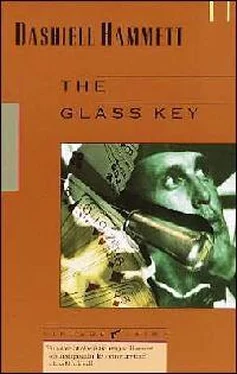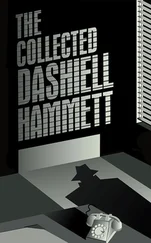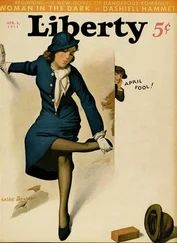Дэшил Хэммет - The Glass Key
Здесь есть возможность читать онлайн «Дэшил Хэммет - The Glass Key» весь текст электронной книги совершенно бесплатно (целиком полную версию без сокращений). В некоторых случаях можно слушать аудио, скачать через торрент в формате fb2 и присутствует краткое содержание. Год выпуска: 1931, Жанр: Крутой детектив, на английском языке. Описание произведения, (предисловие) а так же отзывы посетителей доступны на портале библиотеки ЛибКат.
- Название:The Glass Key
- Автор:
- Жанр:
- Год:1931
- ISBN:нет данных
- Рейтинг книги:5 / 5. Голосов: 1
-
Избранное:Добавить в избранное
- Отзывы:
-
Ваша оценка:
- 100
- 1
- 2
- 3
- 4
- 5
The Glass Key: краткое содержание, описание и аннотация
Предлагаем к чтению аннотацию, описание, краткое содержание или предисловие (зависит от того, что написал сам автор книги «The Glass Key»). Если вы не нашли необходимую информацию о книге — напишите в комментариях, мы постараемся отыскать её.
The Glass Key — читать онлайн бесплатно полную книгу (весь текст) целиком
Ниже представлен текст книги, разбитый по страницам. Система сохранения места последней прочитанной страницы, позволяет с удобством читать онлайн бесплатно книгу «The Glass Key», без необходимости каждый раз заново искать на чём Вы остановились. Поставьте закладку, и сможете в любой момент перейти на страницу, на которой закончили чтение.
Интервал:
Закладка:
"Jeff's the monkey‑looking guy, huh? Has he been picked up yet?"
"No. Shad took him into hiding with him after you got away, I guess. They had you, didn't they?"
"Uh‑huh. In the Dog House, upstairs. I went there to lay a trap for the gent and he out‑trapped me." He scowled. "I remember going there with Whisky Vassos and being bitten by the dog and knocked around by Jeff and a blond kid. Then there was something about a fire and — that's about all. Who found me? and where?"
"A copper found you crawling on all fours up the middle of Colman Street at three in the morning leaving a trail of blood behind you."
"I think of funny things to do," Ned Beaumont said.
3
The small nurse with large eyes opened the door cautiously and put her head in.
Ned Beaumont addressed her in a tired voice: "All right — peekaboo! But don't you think you're a little old for that?"
The nurse opened the door wider and stood on the sill holding the edge of the door with one hand. "No wonder people beat you up," she said. "I wanted to see if you were awake. Mr. Madvig and" — the breathless quality became more pronounced in her voice and her eyes became brighter—"a lady are here."
Ned Beaumont looked at her curiously and a bit mockingly. "What kind of lady?"
"It's Miss Janet Henry," she replied in the manner of one revealing some unexpected pleasant thing.
Ned Beaumont turned on his side, his face away from the nurse. He shut his eyes. A corner of his mouth twitched, but his voice was empty of expression: "Tell them I'm still asleep."
"You can't do that," she said. "They know you're not asleep — even if they haven't heard you talking — or I'd've been back before this."
He groaned dramatically and propped himself up on his elbow. "She'd only come back again some other time," he grumbled. "I might as well get it over with."
The nurse, looking at him with contemptuous eyes, said sarcastically: "We've had to keep policemen in front of the hospital to fight off all the women that've been trying to see you."
"That's all right for you to say," he told her. "Maybe you're impressed by senators' daughters who are in the roto all the time, but you've never been hounded by them the way I have. I tell you they've made my life miserable, them and their brown roto‑sections. Senators' daughters, always senators' daughters, never a representative's daughter or a cabinet minister's daughter of an alderman's daughter for the sake of variety — never anything but— Do you suppose senators are more prolific than—"
"You're not really funny," the nurse said. "It's the way you comb your hair. I'll bring them in." She left the room.
Ned Beaumont took a long breath. His eves were shiny. He moistened his lips and then pressed them together in a tight secretive smile, but when Janet Henry came into the room his face was a mask of casual politeness.
She came straight to his bed and said: "Oh, Mr. Beaumont, I was so glad to hear that you were recovering so nicely that I simply had to come." She put a hand in his and smiled down at him. Though her eyes were not a dark brown her otherwise pure blondness made them seem dark. "So if you didn't want me to come you're not to blame Paul. I made him bring me."
Ned Beaumont smiled back at her and said: "I'm awfully glad you did. It's terribly kind of you."
Paul Madvig, following Janet Henry into the room, had gone around to the opposite side of the bed. He grinned affectionately from her to Ned Beaumont and said: "I knew you'd be, Ned. I told her so. How's it go today?"
"Nobly. Pull some chairs up."
"We can't stay," the blond man replied. "I've got to meet M'Laughlin at the Grandcourt."
"But I don't," Janet Henry said. She directed her smile at Ned Beaumont again. "Mayn't I stay — a little while?"
"I'd love that," Ned Beaumont assured her while Madvig, coming around the bed to place a chair for her, beamed delightedly upon each of them in turn and said: "That's fine." When the girl was sitting beside the bed and her black coat had been laid back over the back of the chair, Madvig looked at his watch and growled: "I've got to run." He shook Ned Beaumont's hand. "Anything I can get for you?"
"No, thanks, Paul."
"Well, be good." The blond man turned towards Janet Henry, stopped, and addressed Ned Beaumont again: "How far do you think I ought to go with M'Laughlin this first time?"
Ned Beaumont moved his shoulders a little. "As far as you want, so long as you don't put anything in plain words. They scare him. But you could hire him to commit murders if you put it to him in a long‑winded way, like: 'If there was a man named Smith who lived in such and such a place and he got sick or something and didn't get well and you happened to drop in to see me some time and just by luck an envelope addressed to you had been sent there in care of me, how would I know it had five hundred dollars in it?'."
Madvig nodded. "I don't want any murders," he said, "but we do need that railroad vote." He frowned. "I wish you were up, Ned."
"I will be in a day or two. Did you see the Observer this morning?"
"No."
Ned Beaumont looked around the room. "Somebody's run off with it. The dirt was in an editorial in a box in the middle of the front page. 'What are our city officials going to do about it? A list of six weeks' crimes to show we're having a crime‑wave. A lot smaller list of who's been caught to show the police aren't able to do much about it. Most of the squawking done about Taylor Henry's murder."
When her brother was named, Janet Henry winced and her lips parted in a little silent gasp. Madvig looked at her and then quickly at Ned Beaumont to move his head in a brief warning gesture.
Ned Beaumont, ignoring the effect of his words on the others, continued: "They were brutal about that. Accused the police of deliberately keeping their hands off the murder for a week so a gambler high in political circles could use it to square a grievance with another gambler— meaning my going after Despain to collect my money. Wondered what Senator Henry thought of his new political allies' use of his son's murder for this purpose."
Madvig, red of face, fumbling for his watch, said hastily: "I'll get a copy and read it. I've got to—"
"Also," Ned Beaumont went on serenely, "they accuse the police of raiding — after having protected them for years — those joints whose owners wouldn't come across with enormous campaign‑contributions. That's what they make of your fight with Shad O'Rory. And they promise to print a list of the places that are still running because their owners did come across."
Madvig said, "Well, well," uncomfortably, said, "Good‑by, have a nice visit," to Janet Henry, "See you later," to Ned Beaumont, and went out.
Janet Henry leaned forward in her chair. "Why don't you like me?" she asked Ned Beaumont.
"I think maybe I do," he said.
She shook her head. "You don't. I know it."
"You can't go by my manners," he told her. "They're always pretty bad."
"You don't like n‑me," she insisted, not answering his smile, "and I want you to."
He was modest, "Why?"
"Because you are Paul's best friend," she replied.
"Paul," he said, looking obliquely at her, "has a lot of friends: he's a politician."
She moved her head impatiently. "You're his best friend." She paused, then added: "He thinks so."
"What do you think?" he asked with incomplete seriousness.
"I think you are," she said gravely, "or you would not be here now. You would not have gone through that for him."
His mouth twitched in a meager smile. He did not say anything.
When it became manifest that he was not going to speak she said. earnestly: "I wish you would like me, if you can."
He repeated: "I think maybe I do."
Читать дальшеИнтервал:
Закладка:
Похожие книги на «The Glass Key»
Представляем Вашему вниманию похожие книги на «The Glass Key» списком для выбора. Мы отобрали схожую по названию и смыслу литературу в надежде предоставить читателям больше вариантов отыскать новые, интересные, ещё непрочитанные произведения.
Обсуждение, отзывы о книге «The Glass Key» и просто собственные мнения читателей. Оставьте ваши комментарии, напишите, что Вы думаете о произведении, его смысле или главных героях. Укажите что конкретно понравилось, а что нет, и почему Вы так считаете.







